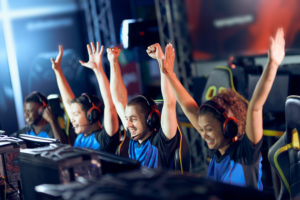
Esports competition
November 2, 2021
A four-student team from Highlands University will be participating in the first New Mexico Educational Esports Classic showcase beginning on Wednesday, Nov. 3.
Eleven teams from high schools and colleges in New Mexico will be competing in the video game competition this week. Playoffs on Friday, Nov. 5, will determine which teams will advance to the finals at the University of New Mexico.
According to assistant professor of English and faculty sponsor for the Highlands esports club, Ben Villarreal, esports is a catch-all term used for competitive video gaming.
“In the last several years it’s really blown up,” said Villarreal. “It’s becoming another social space for fostering teamwork among students.”
The Highlands club will be competing in Rocket League, a game that Villarreal described as being like soccer, but with cars instead of people.
Villarreal said game studies are a part of his scholarly research which is an interest shared by dean of the College of Arts and Sciences, Brandon Kempner. Their mutual interest in games spurred them to create an esports club in 2018, but Villareal said a cyber-attack, followed by the COVID-19 pandemic, slowed their progress.
Highlands senior, Nichalas Fink, is a part of the esports club and will compete in the showcase. He said another challenge in creating competitive esports teams is that the sheer quantity of video games often means it can be difficult to find players who are all familiar with the same game.
“There are too many games in the world and everyone’s coming from a different background, so it’s hard to scrounge enough people together to make a full team for any of these games that range from three to six players required,” said Fink.
Fink said he had never played Rocket League before the team was formed, but two of his teammates have been playing for years.
“I haven’t been playing that long but I’ll play anything to get a team put together,” said Fink. “We got very lucky in our Rocket League team that we have four people who are interested in the game.”
Villarreal said that adding competition to gaming encourages collaboration and challenges students to consider how they think and communicate with one another.
“Like any team sport, learning how to communicate with others and how to strategize and make plans together to achieve certain goals, are the big things that come out of esports,” said Villarreal. “I think, particularly after the after the year that we’ve had, that it’s a good social activity.”
According to Villarreal, the growing popularity of esports has encouraged manufacturers to create games that have social interaction built into them.
“The cool thing about esports programs is that while often those players might be in their own private homes and online, playing with other people, esports as an organization brings those players together so they’re able to play physically in the same space,” said Villarreal. “There’s that aspect of socialization and camaraderie that comes out of it.”
Fink said he’s excited about the esports club on campus because he did not have access to competitive esports teams in his hometown of Trinidad, Colorado. Prior to enrolling at Highlands, Fink said he had only played video games on his own.
“For Rocket League I have to take into account my opponents and my teammates. So, there’s a lot more going on than when I’m playing alone,” said Fink. “But I enjoy gaming a lot more when I have my team with me. When I’m playing by myself it can be a little frustrating because I’ll audibly say, ‘Why would you do that? That was the worst play you could do. I had a shot lined up and you ruined it.’ And, you know, they can’t hear me. So, I’m left with my imagination of what they’re thinking.”
Jonathon Cordova, an Information Technology technician at Highlands, said he set up the university’s games lab in the Stu Clark building, where the preliminary games for the esports showcase will take place. As a gamer himself, Cordova said having a fast internet connection is essential for competitive gaming.
“I think the esports team is a big attraction for high schoolers who are graduating. Both Robertson and West Las Vegas have esports clubs,” said Cordova. “We have the equipment; we have the space for it. It’s just a matter of getting students involved.”
Fink said he’s hopeful that the Highlands Rocket League team will make it to the finals at UNM.
“If we do make it the top eight, then we get to actually play against the other teams in person, which adds a very specific layer to the competition, because at any point, I can look over and see if they see if my opponents are calm, or sweating. And based on how they look, that could be a major confidence boost,” said Fink. “I’m pretty used to competing in front of an audience. I don’t get stage fright very easily. In fact, I think I think it fuels me and makes me want to play better to give the audience an actual show.”
Although the preliminary games this week will not be open to the public due to COVID-19 precautions, the finals at UNM will be live streamed.
Villarreal said he’s excited that the students are learning so much every time they meet to practice.
“At my core I’m a teacher, so anytime I see students learning something new, it’s exciting,” said Villarreal. “I’m excited to see them compete and to see this thing that we started a couple of years ago come to fruition.”
Although he’ll soon be graduating, Fink said he wants to see the club continue, too.
“We want to get the word out about this stuff,” said Fink. “It’s a growing industry and we’re just helping to populate it.”
